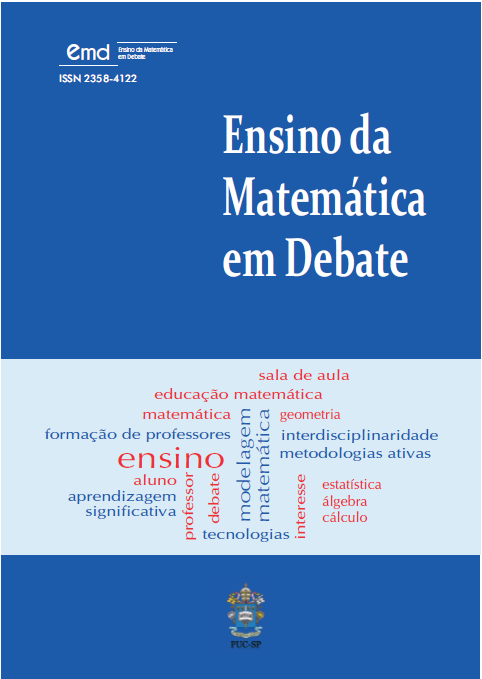COMBINATORIAL REASONING IN THE EARLY YEARS OF SCHOOLING
an approach with alternative teaching materials
Keywords:
Combinatorial reasoning, Alternative materials, Initial yearsAbstract
Our research is focused on the notion of Combinatorial Reasoning which is based on the idea that students since the early years develop competence and skills in solving problems related to notions of combinatorial analysis and not only at the Cartesian level, as it is mostly the practice in teaching of basic schools. Our objective was to describe the actions and narratives of teachers in initial training involved in a workshop whose theme was the development of tasks related to Notions of Combinatory Reasoning using alternative materials. The research refers to one of the workshops developed in the Tasks project with alternative didactic materials with an approach to Combinatorial Reasoning notions in the Early Years of Schooling, within the Institutional Program of Scientific Initiation Scholarships of the Federal University of Pará, carried out with a class from Integrated Degree in Sciences, Mathematics and Languages, from the Federal University of Pará, from the Institute of Mathematical Education and Sciences, of which 29 students had participated assiduously in the workshops. The intervention contributed to the understanding of how to approach the notion of Combinational Reasoning in the early years of schooling, using alternative materials such as abacus, golden material and others.
References
BATANERO, C., ORTIZ, J. J. Y SERRANO, L. Investigación en didáctica de la probabilidade. UNO, v. 44, p. 7-16, 2007.
BATANERO, C., GODINO, J. D. and NAVARRO-PELAYO, V. The use of implicative and correspondence analysis for assessing pupils’ combinatorial reasoning, In: R. Gras (Ed), Actes du colloquem ethodesd analyses statistiques multidimension nelle sen Didactiquedes Mathematiques. IRMAR, Rennes, p. 245–256. 1996.
BATANERO, NAVARRO-PELAYO, GODINO. Efeito do Modelo Combinatório Implícito no Raciocínio Combinatório em Alunos do Ensino Secundário. Educational Studies in Mathematics, v. 32, p. 181– 199, 1997.
BORBA R. E. S., ROCHA R. C. A., AZEVEDO J. Estudos em Raciocínio Combinatório: Investigações e Práticas de Ensino na Educação Básica. Bolema, Rio Claro (SP), v. 29, n. 53, p. 1348-1368, 2015.
BRASIL, Parâmetros curriculares nacionais: Matemática. Secretaria de Educação Fundamental. Brasília: MEC, 1997.
BRASIL. Base Nacional Curricular Comum: versão final. Secretaria da Educação Fundamental. Brasília, 2017. Disponível em: <http://basenacionalcomum.mec.gov.br/>. Acesso em: 18 de setembro. 2019.
FISCHBEIN, E., PAMPU, L.; MINZAT, I. Effect of Age and Instruction on Combinatorial Ability in Children. British Journal of Educational Psychology, v. 40, p. 261–270, 1970.
FISCHBEIN, E. The Intuitive Sources of Probabilistic Thinking in Children. Dordrecht, Holland: Reidel Publishing Company, 1975
GUIMARÃES, F. Sentidos do zero. 112 f. Dissertação (Mestrado em Educação Matemática) – Pontifícia Universidade Católica de São Paulo, São Paulo, 2008.
IFRAH, G. Os Números: A história de uma grande invenção. 9 ed. São Paulo: Globo, 1998.
INHELDER, B.; PIAGET, J. De la lógica del niño a la lógica del adolescente. Trad. M. T. Cevasco. Buenos Aires: Paidós (originalmente publicado em 1955). 1972.
KAPUR, J. N. Combinatorial Analysis and School Mathematics. Educational Studies in Mathematics. v. 3, p. 111 - 127, 1970.
MELO L. M. S., SILVA J. F. G., SPINILLO A. G. Os Princípios Invariantes e a Resolução de Problemas de Raciocínio Combinatório. Em Teia: Revista de Educação Matemática e Tecnológica Iberoamericana. v. 7, n. 1, 2016.
MORAES, G. M. Organizações didáticas nos livros didáticos nos anos iniciais do ensino fundamental: o caso da noção de raciocínio combinatório. 149 f. Dissertação (Mestrado em Educação em Ciências e Matemáticas) – Universidade Federal do Pará, Belém, 2017.
NÓBREGA G. M. M., SPINILLO, A. G. A. Noção de Possível na Probabilidade e na Combinatória em Estudantes do Ensino Fundamental. Em teia: Revista de Educação Matemática e Tecnológica Iberoamericana, v. 7, n. 1, 2016.
PEREIRA J. F. F., CURI, E. Problemas que Envolvem Relação Entre Dois ou Mais Conjuntos no Âmbito do Raciocínio Combinatório. Em teia: Revista de Educação Matemática e Tecnológica Iberoamericana, v. 7, n. 1, 2016.
SANTOS J. S. S., MERLINI V. L. Situações-problema Elaboradas Por Professores Dos Anos Iniciais. Educação Matemática Pesquisa, v. 20, n. 1, p. 021-040, 2018.
PIAGET, J.; INHELDER, B. La genèse de l’idee de hasard chez l’enfant. Presses Universitaires de France, Paris,1951.
SEIFE, Charles. Zero: a biografia de uma idéia perigosa. Lisboa: Gradiva, 2001.
SILVA M. C., PESSOA C. A. S. A Combinatória: Estado da Arte em Anais de Eventos Científicos Nacionais e Internacionais Ocorridos no Brasil de 2009 a 2013. Educação Matemática Pesquisa. São Paulo, v.17, n. 4, pp.670-693, 2015.
SPINILLO A. G., SILVA J. F. G. Alternativas para Desenvolver Formas Apropriadas de Resolução de Problemas de Produto Cartesiano. Em teia: Revista de Educação Matemática e Tecnológica Iberoamericana, v. 7, n. 1, 2016.
Downloads
Published
How to Cite
Issue
Section
License
Copyright (c) 2021 Ensino da Matemática em Debate

This work is licensed under a Creative Commons Attribution-NonCommercial 4.0 International License.

Este obra está licenciado com uma Licença Creative Commons Atribuição 4.0 Internacional.






